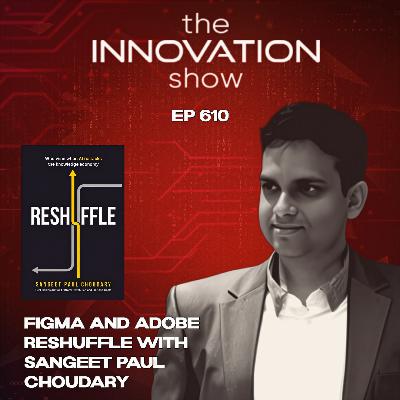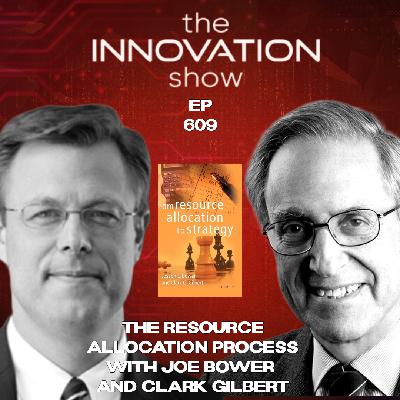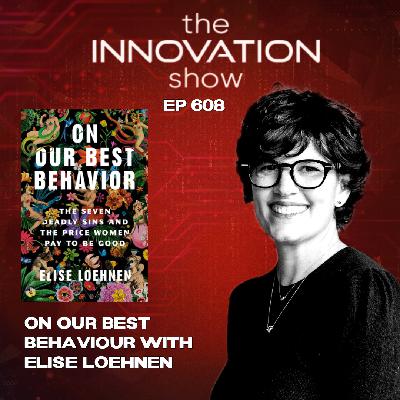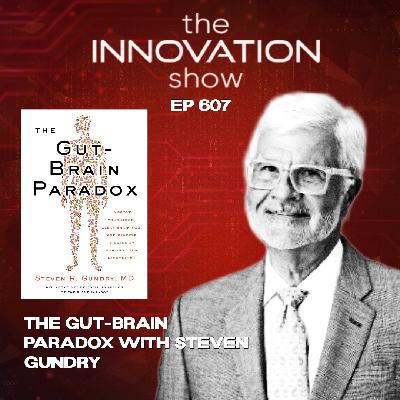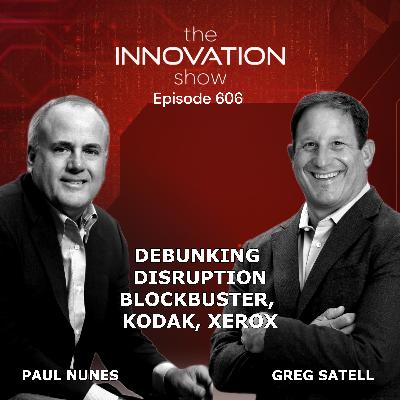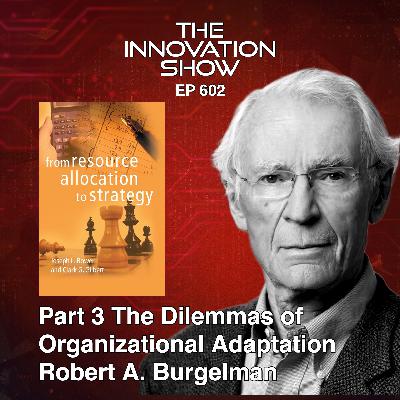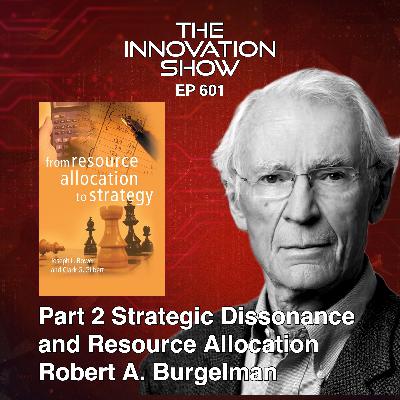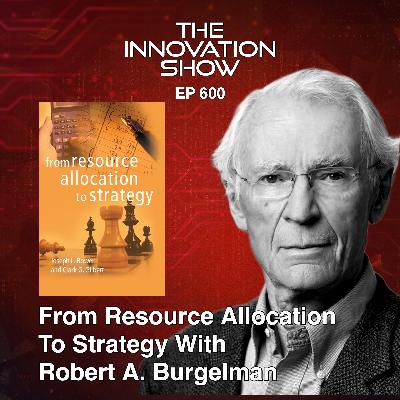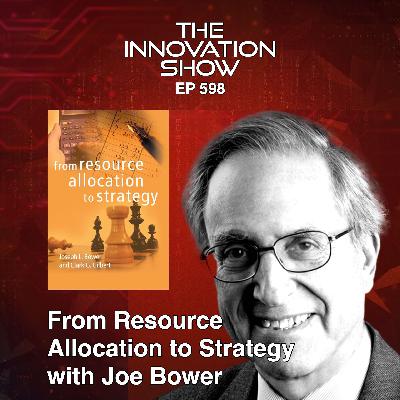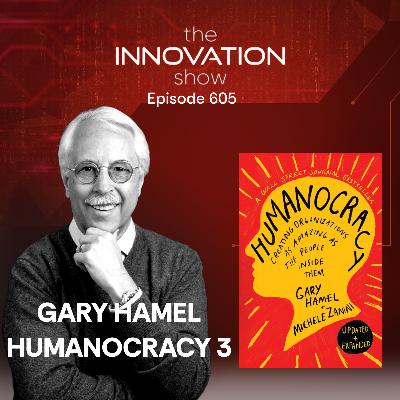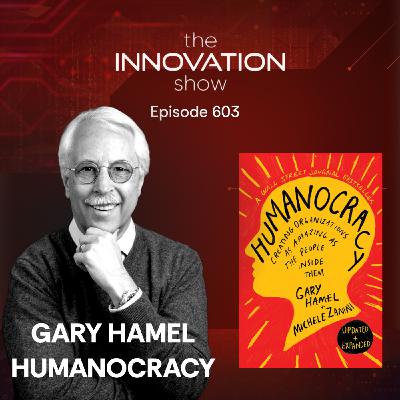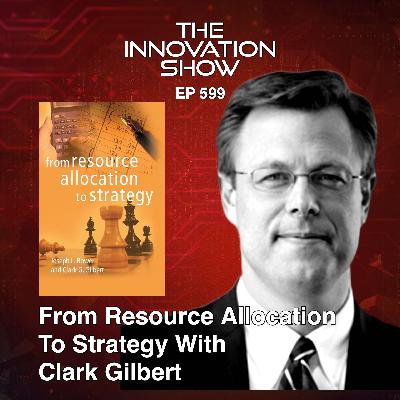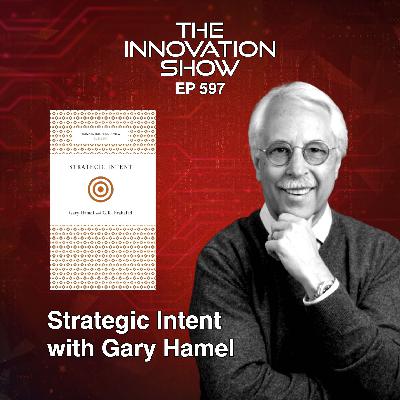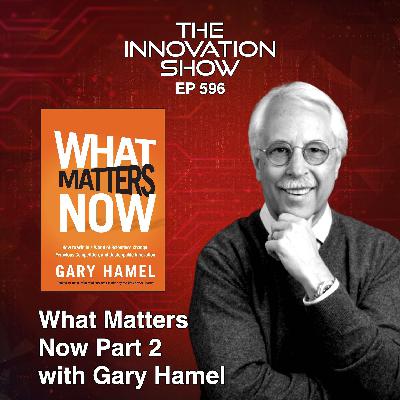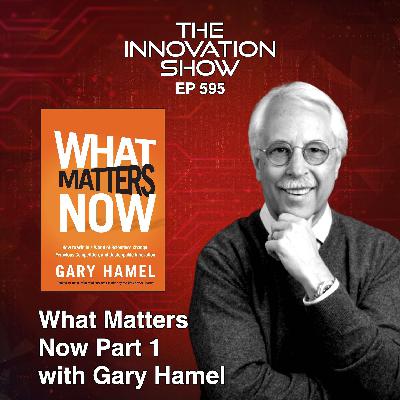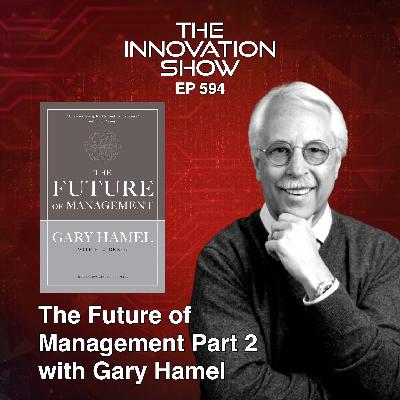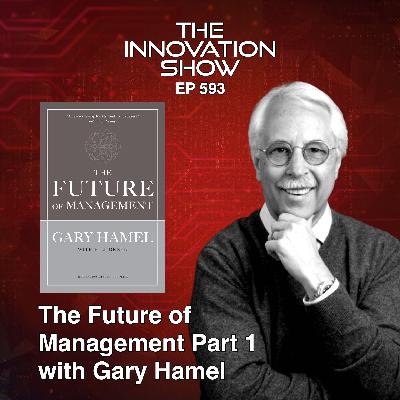Discover The Innovation Show
The Innovation Show

The Innovation Show
Author: The Innovation Show
Subscribed: 604Played: 24,755Subscribe
Share
© The Innovation Show
Description
A Global weekly show interviewing authors to inspire, educate and inform the business world and the curious. Presented by the author of "Undisruptable", this Global show speaks of something greater beyond innovation, disruption and technology. It speaks to the human need to learn: how to adapt to and love a changing world. It embraces the spirit of constant change, of staying receptive, of always learning.
703 Episodes
Reverse
Framing is a cognitive muscle we can strengthen to improve our lives, work and future. Today’s book shows us how.” We heartily welcome back the author of "Framers: Make Better Decisions In The Age of Big Data", Kenneth Cukier Find Kenneth here: http://www.cukier.com @kncukier https://www.economist.com/books-and-arts/2021/05/11/imaginative-framing-is-the-key-to-problem-solving
Framing is a cognitive muscle we can strengthen to improve our lives, work and future. Today’s book shows us how.” We welcome the author of Framers: Make Better Decisions In The Age of Big Data Kenneth Cukier Find Kenneth here: http://www.cukier.com @kncukier https://www.economist.com/books-and-arts/2021/05/11/imaginative-framing-is-the-key-to-problem-solving
What happens when startups like Figma outpace industry giants like Adobe? In this episode of The Innovation Show, Aidan McCullen sits down with bestselling author Sangeet Paul Choudary (Platform Revolution, Reshuffle) to explore how AI, cloud technology, and mindset shifts are reshaping the future of work, design, and competition. Discover why incumbents often fail—not from lack of innovation, but from failing to unlearn old architectures. Using the case of Figma vs. Adobe, we unpack how element-based design, governance-led workflows, and AI-first thinkingare redefining industries from design to law to construction. Key takeaways: Why adapting mindsets matters more than adopting tools How AI is unbundling knowledge work and rewriting career paths The importance of governance in enterprise-wide collaboration Why the forgetting curve is as critical as the learning curve Perfect for innovators, leaders, and professionals navigating the knowledge economy, this episode is a roadmap for thriving in a world of structural uncertainty where AI and cloud-native startups are rewriting the rules. 00:00 Introduction and Sponsor Message 00:17 The Hammer and the Nail: Misreading New Technology 00:28 Adobe vs. Figma: A Case Study in Innovation 01:03 The Importance of Mindset in Technological Shifts 01:20 Guest Introduction: Sanjeet Paul Choudary 01:49 Figma vs. Adobe: A Deep Dive 04:07 Technological Shifts and Organizational Change 05:57 The Impact of AI on Work and Careers 17:00 Governance vs. Execution in Modern Enterprises 18:22 The Future of Competition and Industry Structure 21:40 The Need for Unlearning in the Age of AI 24:34 Preparing for the Future: Skills and Careers 36:54 Conclusion and Final Thoughts 38:05 Closing Remarks and Sponsor Message 📚 Resources & Links • Reshuffle: Who Wins When AI Reshapes the Knowledge Economy → https://amzn.to/3HWwj1I • Platform Revolution → https://amzn.to/4mBq2aQ • Sangeet’s Substack → https://substack.com/@platforms/posts • Aidan’s show notes → https://thethursdaythought.substack.com 🎙️ Listen now to learn how to reshuffle your thinking, your organization, and your career for the AI-driven future.
What if everything you knew about strategy was wrong? In this profound and candid episode, legendary Harvard Business School professors Joseph Bower and Clark Gilbertdismantle the myths of top-down strategy and reveal what actually drives innovation inside organizations — resource allocation. Hosted by Aidan McCullen, this conversation connects over 50 years of organizational research with real-world disruption—from Clay Christensen’s disruptive innovation, to Intel’s strategic shifts, to why academic institutions resist change. 🔥 You’ll learn: Why strategy emerges from internal decisions—not just executive planning The role of middle management and customer capture in strategic failure How organizations can manage dual transformation The secret behind Harvard’s innovation blind spots Advice for innovators, executives, and scholars navigating complex systems This is not your typical leadership podcast. It’s a masterclass in innovation thinking, organizational change, and deep system insights — directly from the architects of the field. 00:00 Introduction and Sponsor Message 00:21 Introducing the Guests: Clark Gilbert and Joe Bower 01:02 Clark Takes Over as Host 01:33 The Connection Between Resource Allocation and Strategy 05:26 Challenges in Strategy Implementation 09:03 Case Studies and Real-World Examples 11:11 Issues in Academic Research 19:48 The Harvard Business School Case 28:10 The Teradyne Case Study 32:41 Elon Musk's Unique Management Style 35:21 The Power of Structural Context in Education 37:50 The Concept of Undermining in Business 39:23 Managing Cognitive Framing in a Changing World 44:06 The Importance of Deep Industry Knowledge 49:16 Advice for Future Scholars 55:56 Final Reflections and Gratitude 📚 Resources and People Mentioned: Book: From Resource Allocation to Strategy – by Bower, Gilbert & others Dual Transformation – by Clark Gilbert & Scott D. Anthony The Innovator’s Dilemma – by Clayton Christensen Case Studies: Intel, Teradyne, Kodak, Harvard Business School 💡 Featured Thinkers Mentioned: Clayton Christensen – Disruptive innovation pioneer, HBS Tom Eisenmann – Strategy & entrepreneurship expert, HBS Donald Sull – Former HBS faculty, expert on execution and volatility Yves Doz – INSEAD professor, known for multinational innovation research Howard Yu – IMD professor; explored tech disruption in Asia Tomo Noda – Japanese academic and innovator in business education reform Robert Burgelman - MIT professor and prolific author
We delve into Elise Loehnan's acclaimed book 'On Our Best Behaviour,' exploring the societal and cultural forces shaping women's behaviors and the concept of the 'seven deadly sins.' Elise discusses the ingrained cultural pressures that lead women to self-denial and the impact of patriarchal norms. We explore topics such as envy, pride, sloth, and the importance of embracing both masculine and feminine energies for a balanced life. Join us for an eye-opening conversation with insights on redefining cultural narratives and reclaiming full selves. 00:00 Introduction and Sponsor Message 00:35 The Cultural Conditioning of Women 01:39 Guest Introduction: Elise London 02:01 Personal Struggles and Panic Attacks 03:48 The Pressure of Perfection 07:53 The Concept of Goodness in Women 13:45 Historical Myths and Gender Roles 19:17 The Origins of the Seven Deadly Sins 28:47 The Witch Trials and Cultural Trauma 37:08 Balancing Roles and Responsibilities 47:09 Embracing Discomfort and Presence 48:10 Understanding Envy as a Directional Signal 48:29 The Gateway to Other Sins: Envy 49:45 Women and Envy: A Cultural Examination 50:33 The Role of Envy in Personal Desires 53:21 Reframing Envy and Scarcity 54:28 The Impact of Cultural Narratives on Women 01:09:07 Pride and Gender Bias in the Workplace 01:17:13 The Importance of Sadness and Emotional Expression 01:28:23 Final Thoughts and Call to Action Find Elise: https://www.eliseloehnen.com Podcast: https://eliseloehnen.substack.com/p/the-podcast Substack: https://eliseloehnen.substack.com New Book: https://amzn.to/47pK7Mw On Our Best Behaviour Book: https://amzn.to/4owiQOH
Unveiling the Gut-Brain Connection: Dr. Steven Gundry on Leaky Gut, Microbiome, and Health In today's episode, we dive deep into the fascinating world of the gut-brain connection with Dr. Steven Gundry, a prolific author and expert on the subject. Starting with a brief introduction about our sponsor, Kyndryl, we explore the historical context of medical insights from figures like Hippocrates and Ignaz Semmelweis. Dr. Gundry shares compelling stories from his practice, including miraculous patient turnarounds attributed to gut health. We discuss the latest in microbiome research, the concept of leaky gut, and how our gut's terrain influences overall health. Learn about the critical role of bacteria in our body's ecosystem, the intelligence of microorganisms, and their impact on our well-being. Join us as we unlock the secrets of a balanced inner terrain and its implications for a healthier life. 00:00 Introduction and Sponsor Message 00:30 Dedications and Historical Insights 02:06 Guest Introduction: Stephen Gundry 03:04 Remarkable Patient Stories 07:19 The Gut-Brain Connection 12:52 Historical Debate: Pasteur vs. Bechamp 16:58 Microbiome Discoveries and Implications 19:08 Bacterial Intelligence and Communication 26:29 Elephant Communication and Eavesdropping 27:04 Understanding Leaky Gut 27:52 Aging Research and Sea Elegans 29:45 The Role of Tight Junctions in Gut Health 32:46 Impact of Diet and Antibiotics on Gut Health 36:44 Environmental Toxins and Autoimmune Diseases 37:40 Lipopolysaccharides and Immune Response 42:03 The Rise of Food Sensitivities and Allergies 47:05 Gut Microbiome and Food Cravings 48:10 Conclusion and Resources Find Steven: https://drgundry.com
In this episode of the Innovation Show we delve into the myths and realities of business failures with Greg Satell and Paul Nunes. Join us as we explore classic case studies of companies like Blockbuster, Kodak, and Xerox, and uncover the untold stories behind their perceived failures. We discuss the complexities of decision-making, the importance of controlling the narrative, and the crucial lessons business leaders can learn from past mistakes. 00:00 Welcome to the Innovation Show 01:55 The Innovator's Dilemma: A Classic Quote 02:05 Introducing the Guests: Greg Satel and Paul Nula 02:43 The Myth of Learning from Failures 03:07 Greg's Experience with Misaligned Case Studies 05:07 Paul's Perspective on Research and Interviews 05:17 The Complexity of Decision-Making in Organizations 15:30 The Blockbuster vs. Netflix Case Study 21:44 The Role of Leadership and Context in Business Decisions 43:45 Milking the Cash Cow: Challenges and Strategies 45:21 Blockbuster's Rapid DVD by Mail Transition 46:30 Adobe's Cloud Shift and Kodak's Digital Dilemma 48:42 Kodak's Struggle with Digital Photography 54:43 Fuji's Diversification Success 58:29 Intel's Missed Opportunities and Target Fixation 01:06:40 Xerox's Innovation and the Birth of the Laser Printer 01:20:44 Lessons from Xerox and Pixar's Origins 01:24:26 Empowering Emerging Leaders and Final Thoughts Perfect for business leaders, strategists, and innovation professionals who want to move beyond the clichés and understand what truly drives long-term success—or failure. Find Greg: https://gregsatell.com Find Paul: https://www.linkedin.com/in/paul-nunes-5351773/ 🔗 Listen on your favorite podcast platform or visit: https://theinnovationshow.io 🧠 Featuring: Greg Satell – Author of Mapping Innovation Paul Nunes – Global Managing Director of Thought Leadership, Accenture Research Host: Aidan McCullen – Author of Undisruptable
Strategic Innovation and the Joe Bower Model Extended with Robert Burgelman In this episode, host Aidan McCullen delves into the intricacies of strategic innovation with Professor Robert Burgelman. The discussion focuses on the extension of the Joe Bower model, exploring organizational adaptation, strategic dissonance, and the strategic context process. Burgelman elucidates four types of strategic context processes: rationalizing new initiatives, dissolving core business contexts, the emaciation of strategic contexts, and the fizzling out of proactive strategic contexts. Key insights include the balancing act between positional advantages and distinctive competencies, the dilemmas faced by multi-business companies, and the challenges of insufficient variation and co-evolutionary lock-ins. The episode also touches upon the importance of strategic leadership in navigating these complex dilemmas. This deep dive is a must-watch for anyone interested in organizational strategy and corporate innovation. 📘 Based on decades of research and experience alongside Andy Grove at Intel, Burgelman offers frameworks every leader needs to navigate uncertainty and disruption. 🎧 Hosted by Aidan McCullen 🎯 Featuring case studies from Intel, HP, Nokia, Apple, JetBlue & more #RobertBurgelman #OrganizationalAdaptation #StrategicDissonance #AidanMcCullen #InnovationShow #IntelStrategy #NokiaCaseStudy #ClarkGilbert #GaryHamel #AndyGrove #StrategyExecution #CorporateInnovation #LeadershipDevelopment #BusinessTransformation #InnovationLeadership 00:00 Introduction and Sponsor Message 00:45 Welcoming Professor Robert Burgelman 00:59 Strategic Dissonance and Context Processes 02:35 Intel's Strategic Context Evolution 07:13 Clark Gilbert's Duality Insight 09:07 Disruption from Above and Below 16:58 Intel's Competency and Position Traps 27:51 Multi-Business Dilemma 39:35 Adapting Organizations to Changing Environments 40:42 Case Study: Swedish Media Company ER Bony News 42:23 Challenges of Biased Leadership 42:51 Intel's Strategic Shifts and Learning Curves 44:47 Co-Evolutionary Lock-In Dilemma 46:06 Exploration vs. Exploitation in Organizations 47:25 Narrow Business Strategy Benefits 50:44 Corporate Venture Capital and AI 57:08 Disruptive Technology Dilemma 58:21 The iPhone's High-End Disruption 01:00:45 Nokia's Missed Opportunities 01:08:34 Strategic Leadership and Emotional Attachment 01:13:02 Concluding Thoughts and Future Discussions
In this episode of The Innovation Show, host Aidan McCullen is joined by Stanford’s Robert Burgelman, one of the foremost thinkers in strategy and organizational evolution. Together, they explore the idea of strategic dissonance—when a company’s day-to-day decisions conflict with its overarching strategy. Drawing from his research at Intel, Burgelman unpacks how induced and autonomous strategyinteract in complex organizations and how leaders like Andy Grove navigated high-stakes inflection points. We cover: 00:00 Introduction and Sponsor Message 00:42 Recap of Intel's History and Strategy 02:15 Intel's Early Innovations and Challenges 07:20 The Rise of Microprocessors 09:19 Strategic Shifts and Market Dynamics 14:36 Intel's Strategic Inflection Points 17:26 Internal and External Ecological Systems 24:55 Missed Opportunities and Strategic Inertia 30:23 Analyzing Strategy Models 37:06 Innovative Gel Product Failure 38:49 Forces in R&D and Management 39:30 Resource Allocation and Product Championing 40:50 Strategic Forcing and Market Growth 42:09 Challenges in New Business Development 44:05 Organizational Championing and Strategy 49:36 Cognitive and Political Dynamics 52:39 Navigating Corporate Innovation 01:00:28 Evolutionary Perspective on Strategy 01:01:47 Prospector, Defender, Analyzer, Reactor 01:06:28 Conclusion and Future Discussions
In this episode of the 'Hours of Bower' series, sponsored by Kyndryl, we delve into Chapter 3 of 'From Resource Allocation to Strategy' with Professor Robert Burgelman. The discussion centers around a revolutionary view of corporate strategy using Intel Corporation’s transformation over several decades. Professor Burgelman reframes strategy as an emergent and evolving organizational capability, influenced by Intel’s shift from focusing on DRAMs to microprocessors. Key topics include the intricate relationship between top-down planning and emergent strategies, the role of internal and external selection environments, and the concept of strategic dissonance explained through examples from Intel’s history. Join host Aidan and Professor Burgelman as they explore how strategic leadership and innovation can coalesce to drive corporate success in a competitive business landscape. 00:00 Introduction and Sponsor Message 00:30 Overview of Today's Episode 01:50 Guest Introduction: Professor Robert Burgelman 02:21 Early Career and Influences 04:07 Collaboration with Joe Bower 07:11 Intel's Strategic Shift 09:27 Andy Grove and Strategic Dissonance 19:35 Framework for Strategic Leadership 33:32 The Importance of Aligning Actions with Strategy 34:25 Intel's Strategic Shifts and Missed Opportunities 35:35 The Dangers of Dominance in an Industry 37:47 Disruptive Innovation and Strategic Inertia 51:04 Balancing Induced and Autonomous Strategy Processes 52:51 Organizational Ecology and Internal Selection 59:22 HP's Strategic Evolution and Corporate Splits 01:04:12 Conclusion and Final Thoughts
Joseph L. Bower on Resource Allocation and Strategy "Where you stand depends on where you sit." In this exclusive episode of The Innovation Show, Harvard legend Joseph L. Bower shares the untold story behind his groundbreaking work on Resource Allocation to Strategy — a theory that has shaped generations of business leaders, strategists, and scholars. Bower reveals: How real strategy emerges through the decisions of middle managers Why structure drives strategy more than PowerPoint slides do What we can learn from Lou Hughes at Opel, and the power of acting before HQ gives permission Insights into companies like GM, Timken, and even Tesla This is a masterclass in how strategy really works — not in theory, but on the ground. Revisit the origins of strategic thought that still matter today. 00:00 Introduction and Sponsor Announcement 00:42 Introducing the Guest: Joseph L. Bower 03:16 The Origins of Resource Allocation Theory 05:30 Insights from the Field: Case Studies and Key Learnings 17:26 The Role of Empathy and Perspective in Management 20:57 Case Study: Opel's Strategic Response to the Berlin Wall 35:38 Case Study: Timken's Bottom-Up Acquisition 38:04 The Importance of Learning and Adaptation in Strategy 52:59 Conclusion and Final Thoughts 53:25 Closing Remarks and Sponsor Acknowledgment Thanks to our sponsor Kyndryl: https://www.kyndryl.com/us/en
In this episode, we conclude the comprehensive series on Gary Hamel and 'Humanocracy,' diving deep into the principles and practices that can transform entrenched bureaucracies into more dynamic and innovative organizations. Host Aidan interviews Gary Hamel to discuss the persistent issue of bureaucracy stifling economic growth and the groundbreaking transformation at Roche as a case study. The conversation covers the increasing bureaucracy in global companies, the decline in productivity, and innovative methods like outcome-based planning and cross-functional squads to elevate organizational efficiency. The episode also emphasizes personal accountability and offers actionable steps for leaders aiming to foster a more adaptive and resilient work environment. This informative discussion is a must-watch for CEOs and business leaders looking to revolutionize their companies. 00:00 Introduction and Giveaway Announcement 00:52 The Problem with Bureaucracy in Organizations 06:16 Case Study: Roche's Transformation 11:16 Leadership Reboot and Principles at Roche 20:31 Implementing Change: Design Teams and I Squads 26:34 Outcome-Based Planning and Resource Allocation 29:53 Resource Allocation and Organizational Ethos 31:16 Resilience in the Face of Challenges 32:59 Leadership and Change Management 37:47 Cross-Functional Squads and Collaboration 42:43 Patient-Centric Approach 46:31 Personal Accountability and Bureaucracy 50:30 Experimentation and Innovation 56:22 Conclusion and Final Thoughts Find Gary https://www.garyhamel.com
In this episode of the Innovation Show, Aidan McCullen welcomes back Gary Hamel to dive deep into the updated release of his book, 'Humanocracy.' They explore the principles and practices of leading companies like Nucor and Haier that reject traditional bureaucratic models in favor of empowering every employee to be an entrepreneur. Gary Hamel shares insights into the mechanisms driving innovation and strategic shifts in these organizations. Find out how micro-enterprises, internal contracting, and a culture of trust and accountability can turn any organization into a breeding ground for innovation and sustained growth. Sponsored by the Kyndryl Institute, whose biannual journal offers thought leadership on AI, global trade, and transformation. 00:00 Introduction to the Innovation Show 00:49 Welcoming Gary Hamel and Discussing Humanocracy 01:55 The Need for Organizational Reset 02:35 Motivation and Models for Change 03:40 Deep Mindset Changes and Migration Path 04:08 Case Study: Nucor's Innovative Management 11:29 Nucor's Management Model and Success 13:01 Empowerment and Reward Systems at Nucor 16:35 Coordination and Trust at Nucor 27:25 Humanocracy Traits and Nucor's Approach 42:30 The Evolutionary Process in Organizations 43:18 Avoiding Over-Specialization in the Workforce 45:04 The Role of AI in Modern Employment 47:01 Haier's Unique Management Model 52:33 Micro-Enterprises and Market Discipline 58:47 Ecosystem Micro Communities at Haier 01:01:14 Entrepreneurship and Ownership at Haier 01:12:42 The Downfall of Intel: A Case Study 01:23:11 Conclusion and Future Discussions #GaryHamel #Humanocracy #InnovationShow #FutureOfWork #OrganizationalChange #PostBureaucracy #Haier #Nucor #AidanMcCullen #FlatOrganizations #StrategyExecution #RadicalManagement
In this episode of The Gary Hamel Series, we explore the principles laid out in 'Humanocracy,' a manifesto that argues for liberating human capabilities from the stranglehold of bureaucracy. We delve into practical strategies for creating more dynamic, innovation-driven organizations. Special guest, Gary Hamel, discusses the economic and social implications of bureaucratic systems and presents alternative management models exemplified by companies like Morningstar and Nucor. We also reflect on personal anecdotes and shared experiences that highlight the soul-crushing effects of traditional bureaucratic structures. Thank you to our sponsor, Kyndryl, for supporting this series focused on harnessing technology for smarter decisions and faster innovation. 00:00 Introduction and Sponsor Message 00:58 Overview of Humanocracy 02:08 Gary Hamel's Return and Dedications 02:51 Audience Feedback and Testimonials 05:18 The Problem with Bureaucracy 09:46 Personal Anecdotes and Case Studies 17:37 Economic Implications of Bureaucracy 19:27 The Need for a New Management Model 38:26 Post-Bureaucratic Pioneers 39:28 The Shift in Mindset 39:45 Nucor's People-Centric Approach 41:01 The Bureaucratic Worldview 41:54 The Growth of Bureaucracy 44:04 The Persistence of Bureaucracy 45:44 The Role of Managers 55:29 Morningstar's Self-Management Model 01:01:58 The Importance of Principles 01:07:09 Concluding Thoughts and Future Topics 🎯 Subscribe now and follow the full Humanocracy playlist. #GaryHamel #Humanocracy #Bureaucracy #FutureOfWork #AidanMcCullen #InnovationShow #OrganizationalChange #EmployeeEmpowerment #Leadership #PostBureaucracy #Decentralization #StrategyExecution #BusinessInnovation
In this episode, long time friend of the show, Clark Gilbert joins us to discuss his book 'Anomaly Seeking Research, 30 Years of Development in Resource Allocation Theory,' co-authored with Clayton Christensen and others. Gilbert elaborates on key themes from the book, including Joe Bower's groundbreaking 1970 resource allocation model, and how this framework has shaped decades of strategic management research. He provides valuable insights into the iterative and multi-level nature of resource allocation processes and how they influence organizational strategy. Real-world examples from various industries, including media and academia, are used to illustrate core concepts. The episode also explores the impact of customer dependency and non-consumption on resource allocation and strategy formation. Sponsored by Kyndryl, this episode offers a deep dive into how innovative strategies are developed and executed across different sectors. 00:00 Introduction and Sponsor Message 00:34 Purpose of the Book and Key Insights 01:59 Clark Gilbert's Journey and Joe Bower's Influence 03:21 Resource Allocation Theory in Practice 08:19 Anomalies and Theoretical Insights 09:46 Real-World Applications and Case Studies 18:33 Personal Reflections and Broader Implications 29:04 BYU Pathway and Dual Transformation 31:38 Gary Hamel's Insight on Resource Allocation 32:10 Challenges in Media Transformation 32:38 Digital vs. Analog Dilemma 33:15 Resource Allocation in Practice 36:23 Sales Team Resistance to Digital 38:39 Disruptive vs. Sustaining Innovations 42:24 The Role of Resource Allocation in Strategy 54:42 Non-Consumption and New Markets 58:03 Empathy and Organizational Change 59:15 Conclusion and Acknowledgements Previous Episode with Clark Gilbert: https://theinnovationshow.io/episode/clark-g-gilbert-on-dual-transformation/
The Power of Strategic Intent: Insights with Gary Hamel | Aidan McCullen In this episode, Aidan McCullen and Gary Hamel dive into the key principles of strategic intent and how companies can maintain competitiveness in a rapidly evolving market. They explore concepts like building layers of advantage, searching for vulnerabilities in competitors, and the importance of continuous learning and innovation. Using examples from the Japanese auto industry to modern companies like Komatsu and Roche, Hamel explains how ambitious strategy is vital for long-term success. This discussion is rooted in Hamel's acclaimed article 'Strategic Intent,' co-authored with CK Prahalad, offering timeless lessons for business leaders. 00:00 Introduction to Competitive Strategy 01:16 The Importance of Strategic Intent 05:14 Challenges in Modern Business Thinking 09:09 The Role of Ambition in Strategy 19:00 Case Studies: Komatsu and Beyond 25:39 The Need for Organizational Resilience 28:18 Komatsu vs. Caterpillar: Strategic Responses 28:52 Timeframes in Strategy: Short, Medium, and Long Term 29:25 The Importance of Ambitious Goals 30:56 Learning and Flexibility in Organizations 32:25 Strategic Intent vs. Strategic Planning 34:51 Challenges and Feasibility in Strategic Goals 36:41 The Role of Strategic Intent in Leadership 45:53 Building Competitive Advantage Through Skills 48:59 Global Competitors and Layers of Advantage 52:53 Final Thoughts and Recommendations The 1989 Article: https://hbr.org/1989/05/strategic-intent-2 The Small Book: https://amzn.to/4kMiDo4
Gary Hamel joins us to delve into part 2 of his book 'What Matters Now,' exploring the crucial role adaptability plays in the modern world. Gary discusses how rapid, multifaceted changes define our age and the stress it places on individuals and institutions. Using various industry examples, from mobile phones to airlines, he emphasizes the importance of continuous reinvention and the challenges businesses face, such as strategic decay and the need for innovation. Hamel also highlights the impact of human foibles on organizational success and the necessity for honesty and humility in leadership. This conversation provides valuable insights into thriving in a world characterized by relentless change. 00:00 Introduction and Welcome 00:10 Adaptability in a Rapidly Changing World 00:47 Historical Perspective on Change 01:35 Technological and Social Upheaval 02:31 Examples of Industry Disruption 04:12 The Challenge of Continuous Reinvention 06:08 The Role of Values and Habits 08:54 Understanding Strategy Decay 13:51 The Predictable Demise of Strategies 20:26 The Corrupting Nature of Success 24:12 Identifying Defensive Language in Organizations 25:14 The Importance of Humility and Adaptability 25:34 Lessons from Radiohead and Resourcefulness 26:58 The Impact of Market Shifts on Companies 27:32 Strategic Agility and Human Foibles 28:07 The Changing Landscape of Education 30:44 Fashion Industry Trends and Predictions 33:56 Encouraging Innovation and Risk-Taking 40:28 The Farmer vs. Rancher Analogy 46:11 Concluding Thoughts and Contact Information
Join us in this insightful episode as we welcome back Gary Hamel, author of 'What Matters Now: How to Win in a World of Relentless Change, Ferocious Competition, and Unstoppable Innovation.' In this episode, Gary discusses his latest book, which provides an agenda for building resilient organizations amidst dynamic global challenges. The conversation delves into the importance of core values such as stewardship, accountability, and equity. Gary also reflects on the 2008 financial crisis and its lessons on ethical leadership and innovation. Tune in to explore how businesses can rehumanize their approach, foster a culture of innovation, and retain a sense of purpose and moral high ground. 00:00 Introduction to the Book and Author 01:22 Dedication and Personal Insights 02:13 Book Structure and Context 03:29 The Importance of Values 04:02 Capitalism and Ethical Challenges 10:50 Learning from the Financial Crisis 16:53 Rediscovering Farmer Values 21:19 Renouncing Capitalism's Conceits 29:16 Reclaiming the Noble in Business 38:07 The Importance of Innovation 45:07 Conclusion and Contact Information Gary Hamel, What Matters Now, Reinventing Management, Future of Work, Innovation Culture, Organizational Change, Capitalism Reform, Moral Leadership, Business Ethics, Corporate Accountability, Management Strategy, Values in Business, Adaptive Organizations, Leadership Innovation, Future-Ready Companies, Strategic Agility, Purpose-Driven Leadership, Post-Crisis Management, Employee Empowerment, Organizational Renewal
Welcome to part two of our enlightening series with special guest, Gary Hamel. In this episode, we dive deep into Hamel's insights from his book and explore the evolution of unconventional management models through case studies of pioneering companies like W.L. Gore & Associates and Google. We discuss the principles that distinguish innovative organizations, the challenges of breaking free from traditional hierarchical structures, and the critical role of purpose in driving change. With real-life examples and practical advice, this conversation is a must-watch for anyone interested in future-proofing their organization and reigniting the human spirit at work. 00:00 Introduction and Welcome Back 00:39 Exploring Gore's Unique Management Structure 04:13 Leadership and Followership at Gore 06:26 Commitments vs Assignments at Gore 08:07 Innovation and Collaboration at Gore 20:13 Google's Evolution and Challenges 26:25 Management Innovation: A Critical Necessity 27:00 A Disenchanted View of Google 28:17 The Importance of Lateral Communication 29:51 Utilizing Technology for Collective Intelligence 33:18 Challenging Organizational Orthodoxy 47:20 The Role of Purpose in Driving Change 52:39 Concluding Thoughts on Management Reinvention The Future of Management, Gary Hamel, Management Innovation, Leadership, Organizational Culture, Collaboration, Gore, Bill Gore, Gore-Tex, Decentralized Management, Employee Empowerment, Hierarchy, Organizational Design, Innovative Companies, Workplace Culture, Management Practices, Leadership Development, Decision-Making, Peer Evaluation, Team Dynamics
In this insightful episode, Gary Hamel discusses the foundational ideas behind his book, 'The Future of Management.' Delving into the historical context and evolution of management principles, Hamel explores how long-standing conventions, established by early 20th-century theorists like Frederick Winslow Taylor and Max Weber, continue to shape modern companies. He underscores the need for a radical rethink in organizational management to address contemporary challenges such as innovation, strategic renewal, and employee engagement. Drawing parallels from history, Hamel illustrates how groundbreaking management innovations in companies like Whole Foods, WL Gore, and Nucor have driven exceptional performance. He emphasizes the importance of creating human-centric workplaces that inspire and motivate employees, advocating for a shift away from bureaucratic, control-driven models towards environments rooted in purpose, community, and mutual respect. Join us for part one of this engaging conversation with one of management’s leading thinkers. 00:00 Introduction to the Future of Management 02:01 The Origins of Modern Management 04:17 The Evolution of Management Innovation 08:49 Military Analogies in Management 12:34 The Layers of Innovation 22:20 Historical Management Innovations 29:56 The Industrial Revolution and Management 36:48 The Overlooked Innovation: Management 37:20 Taylor's Influence on Productivity 38:00 Ford's System and Its Limitations 39:04 Bureaucracy: A Double-Edged Sword 41:32 Adapting to the Knowledge Economy 43:16 The Role of Computational Power and Connectivity 45:50 The Need for Organizational Innovation 53:34 Case Studies: Whole Foods and Gore 01:01:54 Building Human-Centric Organizations 01:05:03 Concluding Thoughts on Leadership and Innovation
Comments
 United States
United States







